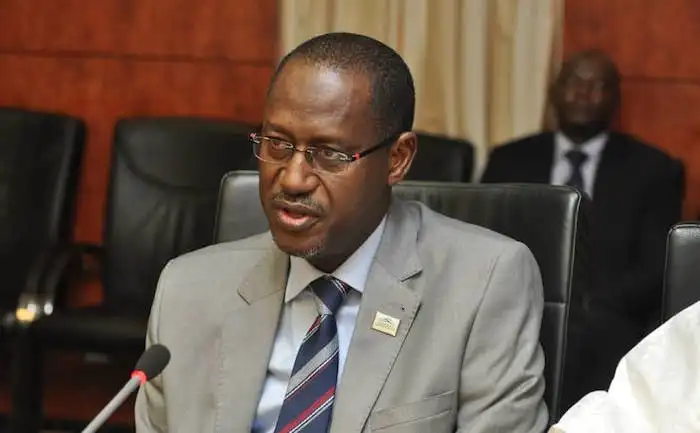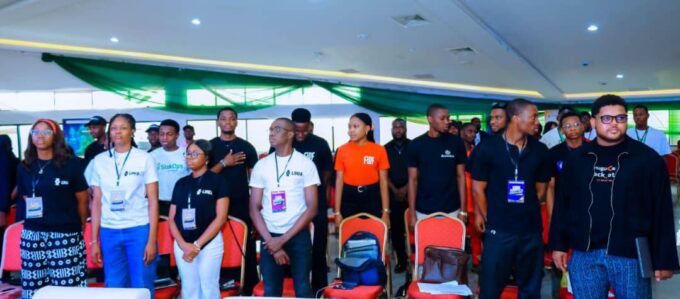From Isaac Anumihe, Abuja
Minister of Housing and Urban Development, Architect Ahmed Musa Dangiwa has revealed that Nigeria has been considered a key partner under the Partnership for Energy Efficiency in Buildings (PEEB), by the German Development Corporations (GIZ).
Dangiwa made the revelation in a meeting in Abuja with the delegation from the German Development Corporations (GIZ) led by the first Secretary and Head of Co-operation, Dr. Karin Jansen.
PEEB is a programme by the German Development Corporations which seeks to build on the efforts of the Nigerian Energy Support Programme to scale up energy efficiency improvements across Nigeria’s building sector.
The minister lauded the PEEB programme, noting that it echoed the vision of the ministry under the Renewed Hope Agenda of President Bola Ahmed Tinubu, to provide houses and create sustainable, climate-resilient, and energy-efficient communities across Nigeria.
While recognising the building and construction sector as a significant contributor to energy consumption and carbon emissions, he emphasised on the importance of promoting energy efficiency and green building practices;
“it is essential to meet national climate goals and ensure a livable future for generations to come” he stated.
The minister acknowledged the remarkable contributions of PEEB in several countries like Mexico, highlighting their successful integration of green mortgages, and the potential for similar systems in Nigeria.
“Here in Nigeria, we see strong potential to adapt a similar green mortgage model especially within the Federal Mortgage Bank of Nigeria (FMBN) under the National Housing Fund (NHF) Scheme, to drive the supply and uptake of energy-efficient affordable homes under our Renewed Hope Housing Programme”, he remarked.
Similarly, Dangiwa cited countries like Vietnam and Tunisia in the programme, pointing out the importance of combining technical expertise, policy support, and targeted financing to deliver measurable impacts.
He expressed the commitment of the ministry to mainstreaming sustainability and climate resilience, demonstrated through strategic partnership with International Finance Corporation (IFC) EDGE, a global green building certification platform, to train technical officers of the ministry, developers, and project managers on sustainable building practices.
Dangiwa, as well informed of his directives that climate-smart, green, and energy-efficient standards be incorporated in housing designs under the Renewed Hope Cities and Estates Programme, as well as all future ministry-led housing initiatives.
Accordingly, the minister outlined plans by the ministry to include a review of the National Building Code, establishment of Building Materials Manufacturing Hubs, and the upgrading of National Urban Renewal Programme to ensure that it embeds resilience and green infrastructure into slum upgrading efforts.
Furthermore, Dangiwa highlighted strong opportunities for collaboration between the ministry and GIZ in several key areas, including technical assistance, public awareness campaigns, capacity building, advisory support to access climate finance and blended finance mechanisms.
He expressed hope that PEEB’s expertise can aid the preparation of high-quality proposals to tap into international funding sources such as: The Green Climate Fund (GCF), the Adaptation Fund, GIZ internal funding opportunities and more.
The minister also expressed keenness to explore partnership between PEEB and the Federal Mortgage Bank to design and pilot a Green Mortgage Scheme, modelled after successful global examples like INFONAVIT, to further drive the adoption of sustainable housing across Nigeria.
Earlier, the Country Director of GIZ, Markus Wagner highlighted the longstanding co-operation between Nigeria and Germany, noting that the two countries signed a bilateral economic relations agreement in 1974, formalised in 2008 under the German-Nigeria Energy Partnership, which identified the energy sector as a key area of collaboration.
Wagner stated that GIZ, has played a vital role in Nigeria by working closely with government stakeholders, providing advisory services that promote investment, innovative and sustainable solutions, as well as climate-resilient practices across the energy sector.
He revealed the intentions of GIZ through the Nigerian Energy Support Programme (NESP) and the Partnership for Energy Efficiency in Buildings (PEEB) to collaborate with the Federal Ministry of Housing and Urban Development.
In a statement, he said that the initiative aims to build the ministry’s capacity to institutionalise sustainable architecture, with a particular focus on integrating energy efficiency into the design, construction, and operation of buildings.
Additionally, Wagner used the opportunity to invite the minister as a special guest of honour to the official launch of the PEEB Cool Enabling Facility in Nigeria, scheduled for June 10, 2025.
He also announced upcoming initiatives planned for the month of May, which includes energy audits in 14 tertiary healthcare facilities and Energy Efficiency Support to Kano State.

















Leave a comment